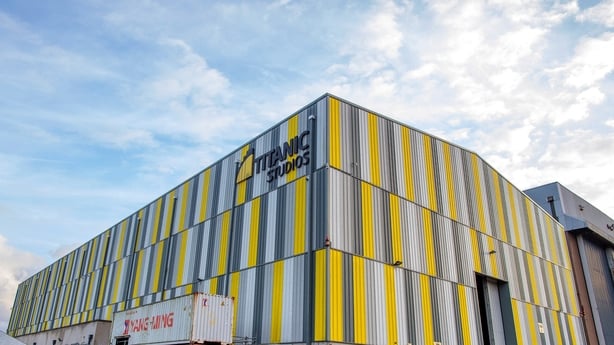Since the Agreement was signed in 1998, Northern Ireland has become the home of award-winning film and TV. But what does this new industry say about the region's complex society, asks Des O'Rawe.
Northern Ireland's film and screen industry is regarded as one of the great success stories of the post-Agreement era; its transformation from the creative and commercial doldrums to the dizzy international heights of productions such as Kenneth Branagh’s Belfast (2021) or The Northman (2022) – not to mention Game of Thrones (HBO, 2011-2019) and Derry Girls (C4, 2018-2022) – emblematic of the region’s post-conflict identity and new political economy.

Of course, other more fortuitous factors facilitated this phenomenon. By the end of the 1990s, for example, the 'digital revolution’ was in full swing, with the commercial film industry being one of its chief beneficiaries. The introduction of HDCAM recorders, ever more advanced memory cards and postproduction software packages soon culminated in the release of major feature films shot and edited entirely with digital technologies, alongside the emergence of more varied modes of distribution and exhibition.
A Titanic investment: NI Screen
These structural developments were reflected in the 1997 reconstitution of the Northern Ireland Film Council (largely committed to a cultural agenda) as the Northern Ireland Film & Television Commission (largely committed to an economic one, and ‘the development of a dynamic and sustainable film industry and culture in Northern Ireland’).
By 2015, it had been renamed NI Screen, and with substantial capital investment, including the Titanic Studios and Belfast Harbour Studios, picturesque locations, tax-breaks and other financial incentives, it has been able to secure large-scale productions for major studios and streaming platforms.

In its 2022-23 business plan, NI Screen could boast that – and despite the impact of Covid-19 – it had exceeded it Department for the Economy (DfE) ‘target to lever £300 million direct spend over the strategy period 2018-22’. It has also fulfilled a cultural and educational remit, most notably through its funding of Irish Language and Ulster-Scots filmmaking.
Finding new cinematic forms
NI Screen’s commitment to attracting international and Hollywood ‘runaway’ productions over the last twenty-five years has certainly proved lucrative but it has also limited the support it can give towards the development of locally based experimental and politically intelligent filmmaking. This is not to say that it has not been instrumental in the production of feature and documentary films that have taken as their subject matter stories, events, and atrocities associated with the Troubles, especially through its partnership with BBC NI. However, the challenge for the next twenty-five years may well involve finding new cinematic forms and thematic variations capable of engaging more meaningfully with the past and Northern Ireland’s legacy of violence.
One of the shortcomings of post-Agreement cinema in Northern Ireland has been its failure to subvert mainstream conventions and genres. In the early years of the peace process, for example, there was a preponderance of black comedies (for example, Divorcing Jack (1998), An Everlasting Piece (2000), or Wild About Harry (2000)) in which the conflict is intentionally – and comically – incidental.
However, this tendency is also true of various thrillers and dramas set in Northern Ireland during this period (for example, Accelerator (2000), Peacefire (2008), Anton (2008), or Closing the Ring (2007)). Even those films that have adopted historical recreation and docudrama techniques, and have provoked considerable debate: for example, Bloody Sunday (2002) or Omagh (2004), as well as Fifty Dead Men Walking (2009) or Five Minutes of Heaven (2009), invariably reproduce the melodramatic tropes and sentimental scenarios that de-politicize the very issues they are seeking to highlight. The standard critique of film representations of pre-Agreement Northern Ireland and the Troubles still applies to any number of contemporary examples.
'Giving voice': documentaries
More recently, documentary has proven to be an important filmic mode of addressing the complexities of post-conflict truth and reconciliation in Northern Ireland, for example: The Disappeared (2013), No Stone Unturned (2017), ReMastered: The Miami Showband Massacre (2019), or Lost Lives (2019). The expansion of documentary production also reflects broader global trends (and the democratization of filmmaking technologies), ‘giving voice‘ to victims and survivors, keeping in circulation important images and oral histories from the Troubles.
We need your consent to load this rte-player contentWe use rte-player to manage extra content that can set cookies on your device and collect data about your activity. Please review their details and accept them to load the content.Manage Preferences
Susan McKay on the Netflix documentary ReMastered: The Miami Showband Massacre
Although the post-Agreement era has produced a number of mythical, futuristic, and gothic-horror films (for example, The Gaelic King (2017), The Survivalist (2015), The Devil’s Doorway (2018)), it is noticeable that filmmakers and producers remain wedded to narrative realism and formulaic genres rarely capable of challenging the dominant political dispensation and the versions of reality it promotes. Meanwhile, as ever more sophisticated screen technologies emerge and increased public funding is invested in the creative industries sector, there remains the danger that such innovations and investments will just produce more of the same rather than creating a potential for radically rethinking film as a vital, imaginative popular artform. In this respect, and much like the current politics of Northern Ireland, its post-Agreement cinema is still a work in progress.
The two part documentary series The Agreement airs on RTE One on April 3rd at 9.35pm and on April 4th at 10.15pm.
This article is part of a collection marking the 25th Anniversary of the Belfast/Good Friday Agreement coordinated by Queen's University Belfast. Its contents do not represent or reflect the views of RTÉ.












































